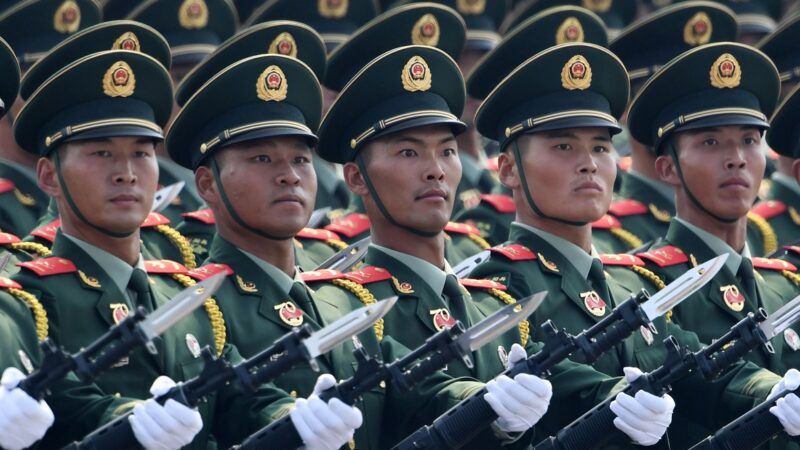The U.S.-China Relationship Doesn't Have To Be 'Increasingly Adversarial'
Many U.S. complaints about China aren’t about actions that threaten U.S. security.

America's relationship with China can't be reduced to a single label, Secretary of State Antony Blinken told CNN's Dana Bash in an interview last week. Beijing is not merely a U.S. "adversary," Blinken said. "There are clearly and increasingly adversarial aspects to the relationship," he allowed, and there are "certainly competitive ones. There are also still some cooperative ones."
That nuanced thinking has been evident in a handful of recent remarks from Blinken about China, and it bodes well for the Biden administration's policy in this arena, which just a few weeks ago was couched in more extreme language. But Blinken's comments also evince an unjustified—and pessimistic—determinism grounded in a misguided perspective on China's military situation. The U.S.-China relationship is indeed multifaceted, and it does not have to become "increasingly adversarial."
Blinken didn't speak about Chinese military posturing on CNN, but he did address it in a speech at Brussels one day prior, where he named China first on the list of military threats facing the United States. "Beijing's military ambitions are growing by the year," Blinken said. That includes "efforts to threaten freedom of navigation, to militarize the South China Sea, to target countries throughout the Indo-Pacific with increasingly sophisticated military capabilities," he claimed, and "the challenges that once seemed half a world away are no longer remote."
It's true that Beijing's military might is not to be underestimated. Though its nuclear arsenal is still far smaller than those of the U.S. and Russia, by spending and many measures of conventional strength, China's military is second only to ours. Blinken is likewise correct that Beijing has expanded its maritime power over the past few decades, especially in the South China Sea, and seeks regional preeminence.
Yet this is not the cross-global threat to U.S. security that Blinken suggests, thanks in significant part to unalterable geographic realities. Consider the differences between U.S. and Chinese geography for defense. The United States spans our continent and borders only two neighbors, both close allies. We are insulated from three quarters of the world's nations by the Atlantic and Pacific Oceans, the world's greatest natural "moat."
China, by contrast, is surrounded. It borders four nuclear states—Russia, North Korea, Pakistan, and India—and must pass through multiple island chains to reach open ocean. Many of China's regional neighbors have robust militaries of their own, and their military spending rapidly adds up to outmatch Beijing's, whose own spending is substantially directed toward domestic authoritarianism and defense. Some of these neighbors (e.g. Japan, South Korea, Taiwan, Australia) are longstanding U.S. partners, but they need no direction from Washington to counterbalance Chinese ambitions.
All this means the United States is neither directly threatened by, nor the only obstacle to, the Chinese regional ambitions Blinken described. "China's is a force hemmed in by geography in a way traditional great naval powers have not been and is also embedded in a region with other powerful states who have their own important maritime capabilities with the wherewithal to further expand them in the years ahead," as Defense Priorities fellow Mike Sweeney has observed. Indeed, "the extent of effort by China to enhance its maritime capabilities is also striking in what it has not achieved," Sweeney notes. "It is little closer to controlling the East, South, and Yellow Seas to the exclusion of other naval forces; nor does it possess the means at this time to decisively invade, occupy, and garrison Taiwan."
Underestimating Chinese power would distort U.S. defense strategy, but overestimating it will produce distortion, too, and that is Washington's characteristic temptation. Believing a military threat from Beijing to be greater and more imminent than it is produces the deterministic thinking Blinken demonstrated when he spoke of the U.S.-China relationship becoming "increasingly adversarial." There is no inherent requirement that this antagonistic dynamic expand. The Thucydides Trap thesis, which postulates that rising and extant great powers must come to blows, is not a law of nature.
It is still possible to steer U.S. engagement with China away from its more adversarial elements—particularly where military conflict is conceivable, as a U.S.-China war would be unthinkably horrific—and toward the cooperative and economically competitive aspects of the relationship to which Blinken also alluded. On one point, at least, the Biden administration is already on the right track: Instead of attempting to "punish" Beijing for the COVID-19 pandemic, for which there is simply no good option, Blinken said the administration is taking a forward-facing approach to "do everything possible to prevent another pandemic."
More broadly, moving away from an adversarial stance means more—and more realistic—diplomacy and cooperation for mutual advantage. It should also mean rejecting calls for risky U.S. military buildup in China's near abroad, as well as Washington's ineffective yet reckless habit of overusing sanctions. China's rise to be a regional power is likely inevitable, but the slide toward an adversarial relationship can and should be reversed.

Show Comments (105)